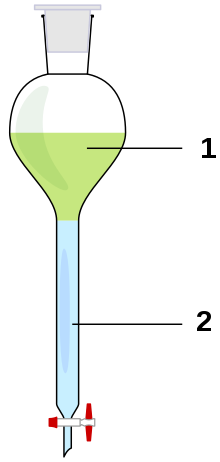Laboratory jargon
As laboratory jargon [ laborʒarˌgɔ ] a non-standard is language variety or a non-standard vocabulary designates which the laboratory is used informally, the work related to the science of employees.
Abbreviations or simplifying expressions are often used here, which are partially scientifically incorrect or incomplete. The person speaking in laboratory jargon assumes that the person addressed nevertheless understands him.
Examples (from chemistry)
- With " fume cupboard ", also called "gas extractor", "fume hood" or "digestorium", is meant a workplace that is closed at the top, back and sides and can also be completely closed off with a front window that is adjustable in height and sometimes laterally. the vapors and gases thus generated do not get into the work area, but are quickly extracted using an extraction device. z. B. “ Go under the trigger with it! "; “That stinks! Go into the trigger with it! "
- Carrying out chemical reactions is often referred to as “cooking”, although in many cases it is not heated at all, but sometimes even cooled. In chemical internships, students and trainees often speak of “cooking preparations”, e. B. " Today I cook p-bromophenol ."
- Solid-state reactions at high temperatures, on the other hand, are often called "roasting", e.g. B. "I'm frying myself a spinel ."
- Heating over the flame of a Bunsen burner is called "heating up".
- Heating to a desired (target) temperature is also called "heating up", but the time required to reach the desired temperature is called "heating time".
- "Rotating" or "rotating in" refers to the distillation of a solvent using a rotary evaporator .
- "Puking over" refers to a boiling delay which can suddenly occur during vacuum distillation and which ensures that the contents of the still in an uncontrolled manner overshoot into the receptacle. This often happens when "rotating in".
- "Sucking off" or "sucking off" means vacuum filtration using a Büchner funnel (nutsche) or a glass filter frit .
- "Shaking out" is the common laboratory jargon for a liquid-liquid extraction with the help of a separating funnel .
- “Spin” is centrifugation using a laboratory centrifuge .
- "Muffling" is heating in a muffle furnace .
- When it comes to solvents, the simple terms “ alcohol ” and “ ether ” usually specifically refer to ethanol or diethyl ether .
- In the field of carbohydrate chemistry is labeled " sugar usually a very specialized carbohydrate" derivative meant and not general language as a sugar called sucrose .
- If metals are reacted with acids to form salts , it is not a question of a dissolution process , but a chemical reaction. Nevertheless - factually incorrect - z. For example, it is often said: " The zinc has completely dissolved in the hydrochloric acid ", which actually means that the water-insoluble, metallic zinc has converted into zinc (II) chloride , which is soluble in the aqueous hydrochloric acid.
- Transferring a substance “quantitatively” (from one container to another) means transferring it to 100% if possible.
- The stirrer bar of a magnetic stirrer is also called "bone" or "stirring fish" or "magnetic fish". If the magnetic stirrer is set too fast and the stir fry hits wildly through the vessel, this is called dancing . To get the stir fry out of the vessel, a magnet, usually covered with Teflon, is used at the tip of a stick, a stir fry rod .
- The blame for an unreproducible result is often apologetically attributed to the catalytic filth , i. H. the accidental and uncontrollable presence of a catalytically active substance.
- " Schlunz " or "Schlumel" is understood to mean the unattractive residue of a distillation, sometimes also a failed synthesis product or an otherwise impure substance.
- An “ion broom” is a small rubber squeegee that is used to transfer precipitation quantitatively (i.e. completely and without losses) from one vessel to another.
- Solvents freed from traces of water are called "dry", a term for drying and cleaning solvents is " absolutization ".
- The use of unnecessary, sometimes technically incorrect prefixes, such as in “boil up” instead of “cook” or “centrifuge” instead of “centrifuge”.
- The use of the diminutive of a device such as Roti (but also "Rota") for a rotary evaporator.
- “Smelling chemically” is the fanning of the smell from a container to the nose with a decreasing distance, starting with approx. 40 cm. This prevents burns of the nasal mucous membrane.
- If an apparatus is "embroidered", it is flooded with nitrogen in order to be able to work with air-sensitive substances. Is also used in connection with other protective gases (e.g. argon). Sometimes this must first be "baked out", which describes the removal of water adhering to the glass with heat, often under reduced pressure.
- "Refluxing" is often referred to as heating under reflux to boil (i.e. with condensation of the solvent vapor in the attached condenser and dripping back into the flask).
literature
- HE Ebel, C. Bliefert: Writing and publishing in the natural sciences. VCH Verlagsgesellschaft Weinheim 1990, 5th edition, pp. 22 and 575, ISBN 3-527-30802-4 , ( limited preview in the Google book search)
